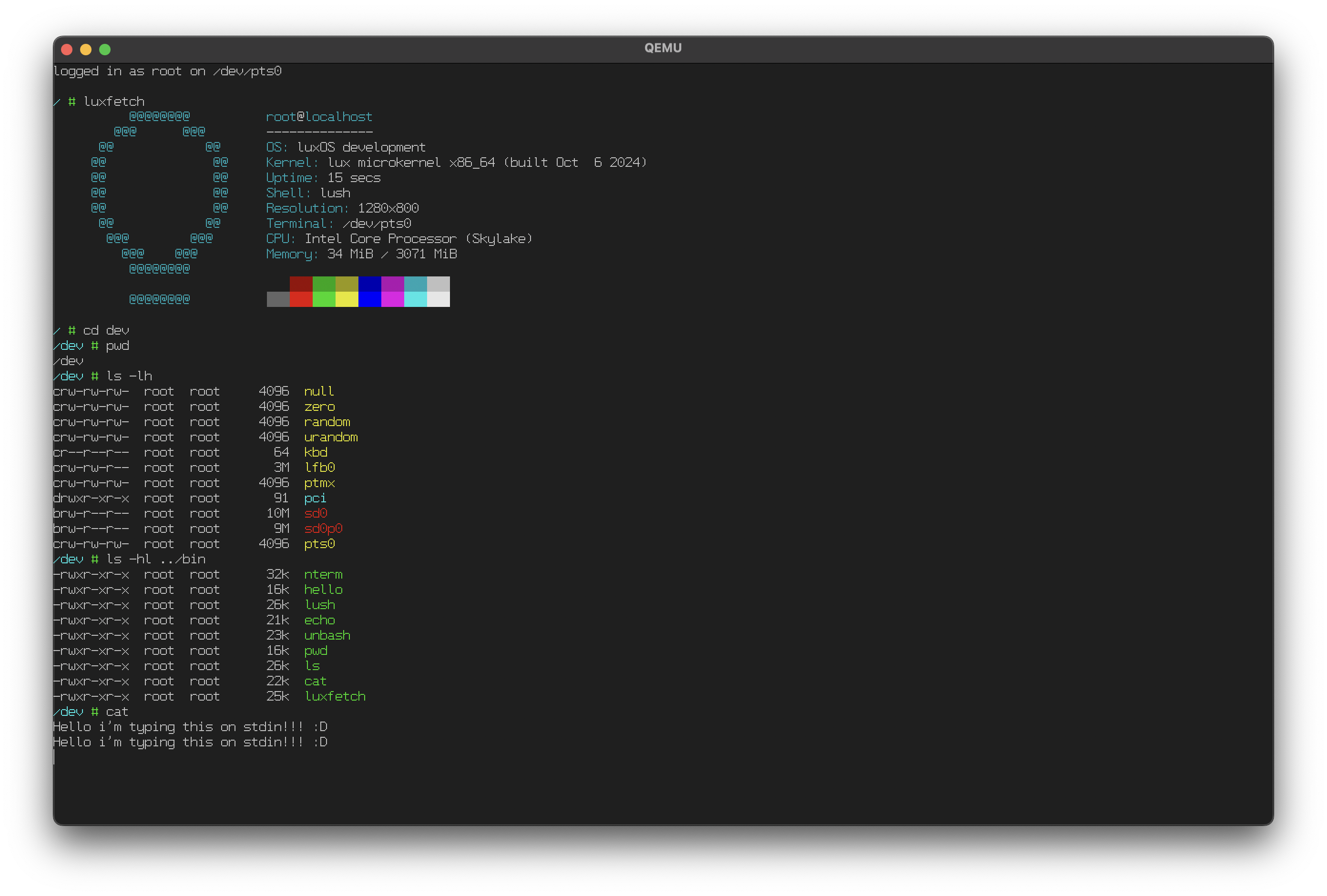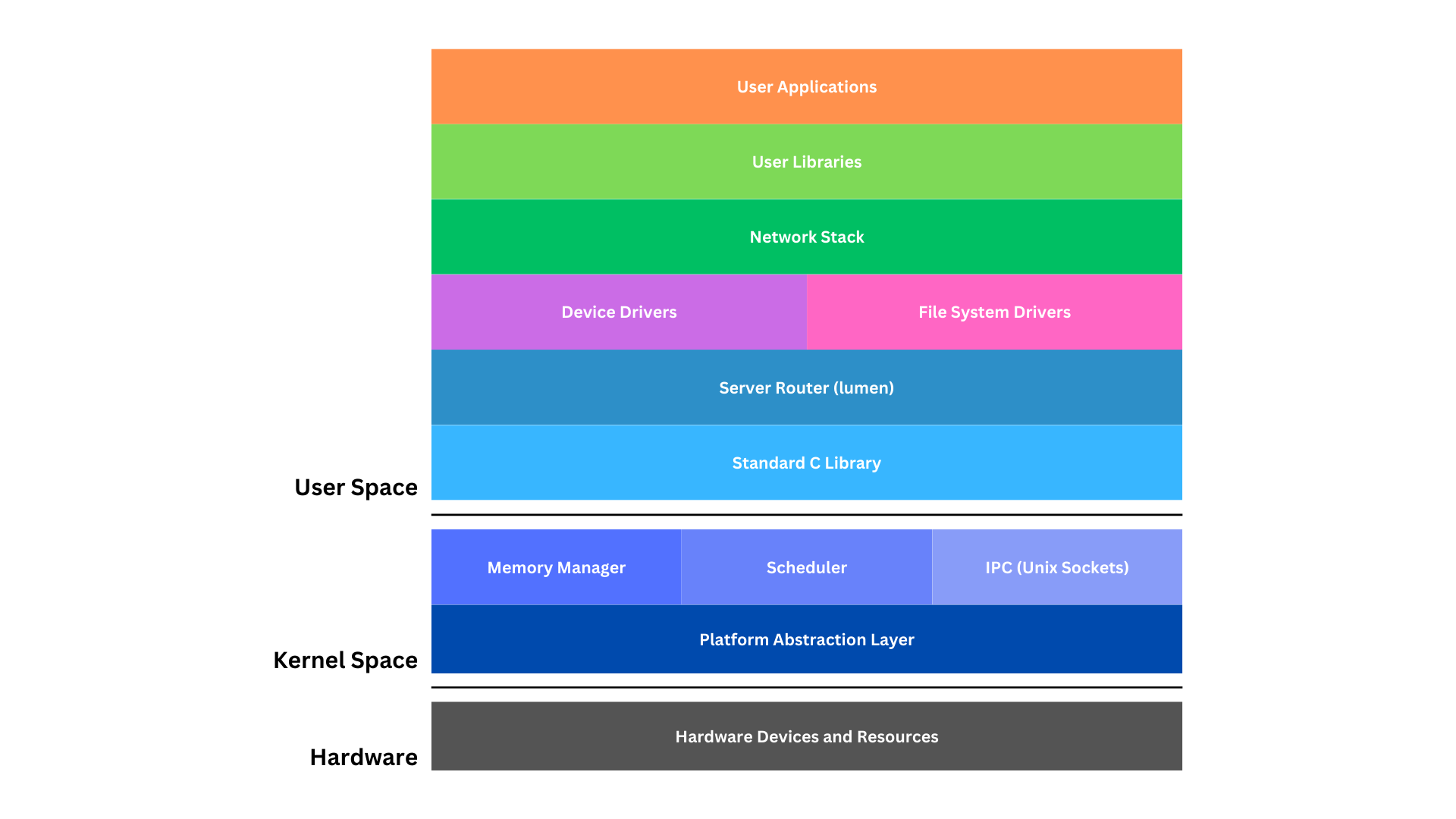lux (intentionally stylized in lowercase) is a portable work-in-progress microkernel written from scratch that currently runs on x86_64, with future plans for an ARM64 port. For the operating system built on the lux microkernel, visit lux-operating-system/lux.
In little over 4,000 lines [1] of code, lux implements memory management, preemptive multiprocessor priority scheduling, interprocess communication, and basic Unix-like system calls. This elimination of bloat minimizes resource consumption compared to mainstream operating systems and increases stability and memory protection. lux is developed primarily as a one-person project, both as a learning and research tool as well as a criticism of the bloat that has become normalized in modern software engineering.
- Portability: At the heart of lux is a platform abstraction layer with a set of functions and constants to be implemented and defined for each platform. This enables ease of porting lux to other CPU architectures.
- Memory management: lux implements a future-proof memory manager that can manage practically unlimited physical memory (as limited by hardware) and virtual address spaces of up to 256 TiB for each thread.
- Multiprocessor priority scheduling: The scheduler of lux was designed with multiprocessor support from the start. The microkernel itself is also multithreaded and can be preempted.
- Interprocess communication: lux implements kernel-level support for local Unix domain sockets to facilitate communication with the servers.
- Unix-like system calls: lux provides a minimal Unix-like API for the common system calls, namely those related to files, sockets, and scheduling. Most of the system calls wrap around external servers implementing the actual functionality.
- Asynchronous I/O: I/O system calls implemented by lux are fully asynchronous. The microkernel threads are never blocked, and user processes can explicitly request either blocking or asynchronous system calls in accordance with POSIX.
lux is a microkernel that provides minimal kernel-level functionality and behaves as a wrapper for a variety of standalone servers running in user space, which provide the expected OS functionality. This design depends on a user space router (lux-operating-system/lumen) to forward or "route" messages between the kernel and the servers. The router additionally doubles as an init program. The servers implement driver functionality, such as device drivers, file system drivers, networking stacks, and other higher-level abstractions. lux, lumen, and the servers follow the client-server paradigm and communicate via standard Unix domain sockets.
This diagram illustrates the architecture of the various components in an operating system built on lux and lumen. It is a work in progress and is subject to change as more components are developed.
All of the described components, including the microkernel itself (with the exception of the scheduler), can be preempted and are fully multithreaded applications for a more responsive software foundation.
Visit lux-operating-system/lux for the full build instructions, starting from the toolchain and ending at a disk image that can be booted on a virtual machine or real hardware. If you don't want to manually build lux, nightly builds also generate a bootable disk image that can be used on a virtual machine.
The lux microkernel and the luxOS Project are both personal educational/research projects and are not planned to be community-developed. However, if you like what you're seeing and/or you learned something, monetary contributions would be greatly appreciated and provide a direct incentive to allocate more time to the project. You can support my work on Patreon if you're interested.
Join the project's Discord server if you just wanna say hi or talk about OS development in general.
The lux microkernel is free and open source software released under the terms of the MIT License. Unix is a registered trademark of The Open Group.
- This figure excludes blank lines, comments, header files, and the platform abstraction layer, retaining only the core microkernel code that forms the basic logic behind lux.
Made with 💗 from Boston and Cairo





